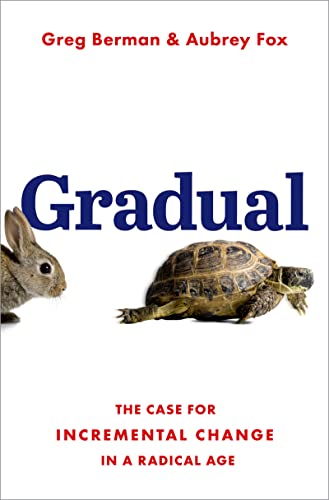
- Free Article: No
- Contents Category: Politics
- Review Article: Yes
- Article Title: Too early to say
- Article Subtitle: The virtues of incrementalism
- Online Only: No
- Custom Highlight Text:
'It is too early to say’ was the legendary response of Zhou Enlai when Dr Henry Kissinger asked him about the effects of the French Revolution – proof, if needed, of an ancient culture acknowledging the long cycle of history. Except Zhou misheard. As Chas Freeman, the retired foreign service adviser at that historic meeting revealed many years later, Zhou assumed that Kissinger was talking about the 1968 student protests in Paris, not the storming of the Bastille. It was, said Freeman, a mistake ‘too delicious to invite correction’.
- Featured Image (400px * 250px):

- Alt Tag (Featured Image): Glyn Davis reviews 'Gradual: The case for incremental change in a radical age' by Greg Berman and Aubrey Fox
- Book 1 Title: Gradual
- Book 1 Subtitle: The case for incremental change in a radical age
- Book 1 Biblio: Oxford University Press, £22.99 hb, 232 pp
- Book 1 Cover Small (400 x 600):

- Book 1 Cover (800 x 1200):

It is a familiar case, as the authors acknowledge. The brilliant Yale economist Charles Lindblom made the same point in 1959 and for decades afterwards (he died just before his 101st birthday, in 2018). Successful policy arises through continuous adjustments for circumstances. Whatever the grand rhetoric of politicians, most policy is a form of ‘muddling through’. In a democracy with authority shared across many institutions, evolutionary change is the most effective way to secure a coalition of support. The outcome may not be conservative, argued Lindblom – increments can be rapid and far-reaching in total, even if such a pragmatic approach disappoints those looking for more visionary articulation of goals.
Lindblom’s student Aaron Wildavsky suspected that officials, faced with multipart choices, quietly relied on incremental decisions to manage complexity. Wildavsky’s pioneering study of US government budgeting compared the lofty aspirations of a proclaimed zero-based approach with the reality that most budget making is just minor annual adjustments to programs.
Michael Lipsky provided a different take on the incremental nature of government programs. His Street-Level Bureaucracy, first published in 1980, noted that programs designed in the legislature prove difficult to implement locally. Hence front-line officials – police, teachers, service centre workers, health workers – subtly rework their mandate. They adapt program ambitions to the circumstances of their community. Clever policy makers, argued Lipsky, learn from this experimentation. Social policy is rarely implemented in a linear fashion, but is shaped on the front line through endless modifications in light of lived experience.
To illustrate their case for incrementalism, Berman and Fox provide case studies from a century of US policy studies. They explain how Franklin Roosevelt’s social security program began with radical promise but in practice adopted a ‘gradual, muddled, and intentionally incremental approach to addressing poverty among the elderly’. Such cautious reform over a long period, conclude the authors, explains the longevity of social security, now an entrenched feature of US life.
Likewise, suggests Gradual, the reduction of street crime in New York City was achieved through four decades of cumulative small improvements in policing, bail laws and incarceration. Incrementalism is offered as the only way to handle a highly contentious issue such as immigration, since no single policy position can command majority support.
By contrast, the case study of Lyndon Johnson’s Great Society underscores how high aspiration among academic advisers and policy makers may disappoint. Programs to improve circumstances for children living with poverty stalled because big changes were implemented quickly with insufficient time to build support or test assumptions about cause and effect.
Gradual acknowledges that incrementalism is an unpopular approach in policy circles. ‘If only there was sufficient political will’ remains the standard rejoinder to those who see incrementalism as just reinforcement of the status quo. Yet some problems prove hard to address, whatever the ambition. Gradual includes a brief discussion of pioneering work on recidivism by the late Joan Petersilia, professor of law at Stanford University. Despite a century of prison reform to reduce re-offending, even the most successful programs cut recidivism by only fifteen to twenty per cent. Such unexceptional results, Petersilia concluded, reflect the multifaceted variables at play when people return to jail, many outside the reach of public policy. Her findings argue for humility when setting goals, given enduring limits to knowledge and influence.
Greg Berman and Aubrey Fox believe a highly polarised polity such as the United States can only achieve important change through gradual reform, relying on the cumulative effect of many small changes, because agreement on big reforms is elusive. We must stumble toward progress. The tone is upbeat, a positive affirmation of possibilities for consensus amid division. Sadly, the book does not explore whether a pressing policy challenge such as global warming can – or should – be addressed by gradualism. Instead, they suggest we listen to Roy Amara, the computer scientist who argued that we overestimate what can be achieved in the short but underestimate what can be accomplished over a longer time – with persistence.
It may still be too soon to say.


Comments powered by CComment